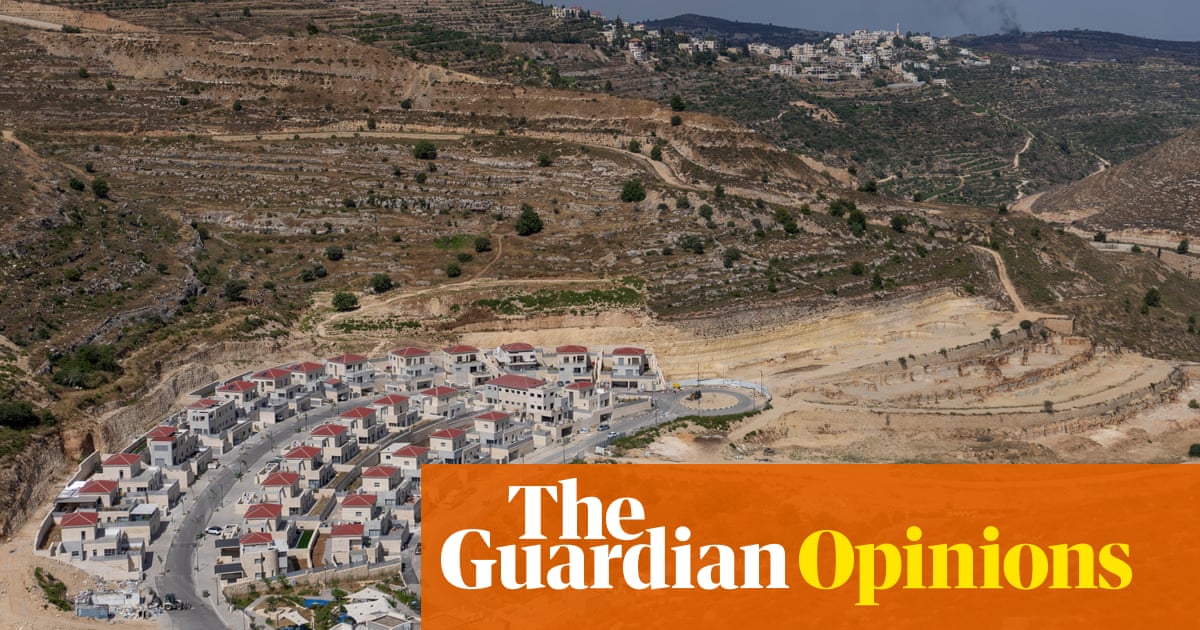Few people in the UK will have heard of Ze’ev Hever. A far-right member of the Jewish Underground in the early 80s, he was convicted in 1984 for attempting to place a bomb under the car of a Palestinian political leader. But in the years since, he has become more sophisticated and influential. He is now the secretary general of Amana, the development company behind some of the most violent settlements and outposts in the West Bank. Last week, the UK government announced that it will impose sanctions on Amana and six other groups that support West Bank settlers – a move that many moderate Israelis such as me welcome.
The No 1 priority of the international community should be to put pressure on the Israeli government and Hamas to agree to a ceasefire deal that would see the fighting end in Gaza, the West Bank and Lebanon and a return of the hostages. But the UK government is right to target the settlement movement in the West Bank: these entities are a serious threat to a peaceful future between Israelis and Palestinians. By imposing sanctions on violent settlers, the UK not only prevents settler violence in the short term, it sends a message that there are red lines and that the international community is losing its patience.
For the most part, settlers who commit acts of violence are not arrested, investigated or prosecuted. In fact, members of the current Israeli government have shown open support for extremist Israeli settlers who commit acts of violence, either by downplaying their actions or by encouraging the illegal building of further settlements and outposts – and in the process consenting to the destruction of Palestinian property and the displacement of Palestinian communities.
Israeli governments – past and present – have been unwilling or unable to deal with this growing problem. It is therefore critical that the international community gets involved by imposing sanctions on those who take part in the violence. With elections looming in the US, and the EU moving at its slow pace, the UK is well placed to shift reality on the ground. Israel’s supreme court has approved Israeli banks’ decisions to cut ties with entities sanctioned by either the UK or the EU – and so the recent round of sanctions will make it much harder to fund and support extremist settler activity in the West Bank.
It is right for the UK to help protect innocent Israelis from missile attacks from Iran and the Houthis and at the same time impose sanctions on Israeli groups that support violent settlements. This way, Israelis who oppose their government see that their security concerns are recognised, and at the same time are encouraged to realise the wrongs and follies of the settlement project. The sanctions are consistent with what should be the long-term strategy of the international community, which is to draw a clear line between legitimate Israel and illegally occupied Palestinian territories. This line should have been drawn decades ago, and might have prevented much bloodshed in the region.
Unfortunately, over the past few years, the side of Israel that favours illegal occupation has dominated its politics. The country is ruled by a far-right and incompetent government. Despite its attempt to demolish the judicial system; its failure to protect its citizens during the Hamas attack of 7 October; the abandonment of the hostages; and its drawing out of the war while refusing to take any responsibility for its own conduct, the reality is that this nightmarish coalition is unlikely to disassemble anytime soon. This is despite the fact that most Israelis distrust the government and are calling for elections; at the same time, there have been mass demonstrations on the streets for a hostage deal that would end the war.
The war in Gaza serves the interests of Benjamin Netanyahu, who knows that once the fighting ends he will have to face the rage of Israelis demanding an investigation into the failure of his government before and during the 7 October attack. It also serves the extremists in his government who fantasise about building settlements in Gaza. The military successes, such as the killings of Hassan Nasrallah and Yahya Sinwar, help the government sell an illusion that “total victory” is possible, and that military force alone will bring security. My parents, both murdered in the 7 October attack, were victims of Hamas violence but also Israel’s overreliance on its military prowess and reluctance to engage in a meaningful political process that would lead to an end to the conflict.
The UK can move the dial. Not only by supporting good faith actors who are working towards a shared future for Israelis and Palestinians. But also with further sanctions. Ze’ev Hever is far from being alone in his expansionist and extreme politics. Itamar Ben-Gvir, Israel’s minister of national security, was convicted in 2007 of incitement to racism and supporting a terrorist organisation, and Bezalel Smotrich, Israel’s minister of finance, has claimed that “Hamas is an asset”. In his view, it is better to have a murderous enemy rather than a partner in peace.
Both are driving Israel’s security and economy to the ground, while strengthening the darkest elements of our nation. Keir Starmer confirmed last week that he is considering sanctions against Ben-Gvir and Smotrich. Many Israelis would be in favour of this action, which would serve the interests of those who believe in a political resolution to the conflict. The next round of sanctions must include Ben-Gvir and Smotrich, and should happen now.
Magen Inon is a London-based father of three from Israel who is a teacher and holds a PhD in philosophy of education
Do you have an opinion on the issues raised in this article? If you would like to submit a response of up to 300 words by email to be considered for publication in our letters section, please click here.
